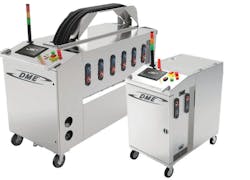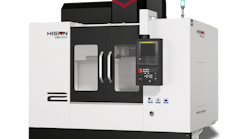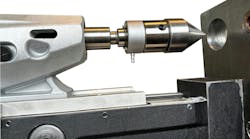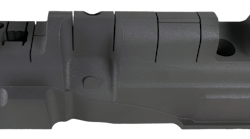Scale and other mineral deposits in injection mold cooling channels can dramatically reduce cooling efficiency, leading to longer cycle times, inconsistent parts and increased scrap rates.
“When you turn on the machine, it will pressure-test the mold,” said Scott Smith, director of sales at DME, which is a Milacron brand. “It is amazing the number of errors we have caught doing pressure checks on molds. Their water lines may have a crack, or the lines may be mismatched and don’t match the engraving on the side of the mold.”
After the pressure test, the machine conducts a flow test to measure the flow rate of every cooling channel in liters per minute. The flow rate is displayed on the machine’s 10-inch touch-screen user interface.
Based on the flow rate and a visual inspection of the cooling channels using a borescope, which is not included with the CoolingCare system, the operator can determine how badly blocked the channels are and what kind of mineral deposits are to blame.
“You will know if you have partially blocked lines that can be cleaned in a few hours, or if it’s worse and CoolingCare needs to run eight hours or overnight,” he said.
The machine can run overnight unattended and notify operators by text message when the channels are clean, or when the channels have achieved a certain flow rate. If the cooling channels are being cleaned on a regular basis — a process Smith calls “maintenance cleaning” — each cleaning cycle will take less time.
“Maintenance cleaning is based on the PM [preventive maintenance] schedule of the tool,” he said. “When the tool goes down for PM, you should run it through the CoolingCare machine.”
Molds can be cleaned while they are connected to the injection molding machine or on a workbench. The machine operates on compressed air at about 84 pounds per square inch.
“There is a pneumatic scrubbing action, and it also pulsates the cleaning fluid back and forth,” Smith said. “The back-and-forth motion, along with the mechanical, pneumatic force, scrubs the lines with the cleaning media. It is a mechanical, pneumatic scrubbing action that is generated by water pressure. We use water-soluble cleaning media.”
DME offers two cleaning media in powder form that are dispersed in water. Operators select one of the two cleaning powders, based on the blockage they observe in the cooling channels.
“If you see rust or iron oxide inside the lines, you should use the DS1 cleaning product,” he said. “If you see calcium-based rust, the white, flaky stuff, use DS2.” Both cleaning media are made with mild acids.
“A lot of people worry about wear on their O-rings from the acid cleaner, but, as soon as you are done cleaning, you can flush the lines with clean water. The machine also does an air blow to make sure all the cleaning material and rinse water in the cooling channels are blown out,” Smith said. “You can set that to run as long as you want so you know that you are not leaving any acid in the cooling channels of the tool.”
CoolingCare can be used on steel and aluminum molds. Aluminum is a softer metal, so operators should use a less acidic solution to clean it, he said.
“CoolingCare is great for getting up into the baffles and conformal cooling inserts,” Smith said. “It was invented by a gentleman who ran a lot of conformal cooling inserts. Those flow lines are like strands of spaghetti, and when you get any rust or blockage up there, it’s very difficult to clean.”
The machine was developed by Fado Sp.A. z.o.o., a Bydgoszcz, Poland, company. DME has an exclusive license to sell CoolingCare in North America and is working to get a global sales license. DME Europe sells the CoolingCare system in Europe.
CoolingCare is available as a two-channel and a six-channel machine. Both versions are fully mobile on wheels and achieve the same results, but it’s important to select the right machine for the job.
The two-channel machine is designed for smaller molds in light-duty situations. “The six-channel machine can accommodate large molds,” Smith said. “If you have more than 100 inches of water line, you will want the six-channel for the increased power. You need to match the number of [Cooling-Care] machine channels with the size of the mold.”
CoolingCare is Industry 4.0-enabled and will text operators if something unexpected occurs. Operators also can text the machine for updates on the cleaning status. The system includes a built-in modem for online diagnostics and service, allowing technicians to perform remote troubleshooting. It has a USB port so users can store mold data and take that data with them on a flash drive.
“The machine stores 3,000 tool configurations on the control pad,” Smith said. “It will keep a chronological history of flow rates every time you clean the tool. It will track what mold was cleaned and when, and it will save that data for future reference. It takes a lot of guesswork out of troubleshooting the tool when you know what the flow rate should be.”
DME announced CoolingCare at NPE 2018, but the product was not launched in North America until April.
“We had an overwhelming response at NPE last year,” he said. “We had to change some things on the machine to get it UL-approved. We went for full UL certification and moved forward on our licensing plan with Fado. We showed it at Amerimold this year and at other events. We are still working through all the sales leads that we got.”
DME will exhibit CoolingCare this month at the Manufacturers Association for Plastics Processors show in Indianapolis and at K 2019 in Germany. The machines are available for purchase or lease, or can be rented for up to 12 months.
Bruce Adams, senior staff reporter
Contact:
DME Madison Heights, Mich., 248-398-6000,







